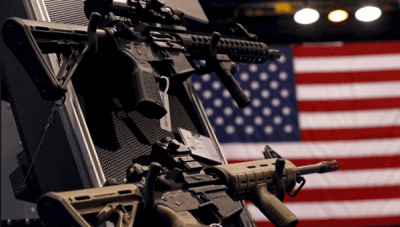Will Trump’s Arms Race Weaken or Strengthen the Russian-Chinese Strategic Partnership?

As risky of a gambit as it is and contrary to conventional thinking on this topic, Trump’s arms race aims to weaken the Russian-Chinese Strategic Partnership by putting President Putin in the position where he has to choose between competing with the American military together with China at the expense of his domestic economic plans or cutting a pragmatic deal with the US at China’s perceived “zero-sum” expense in order to fulfill his campaign promise to revitalize the Russian economy.
Trump’s unveiling of the US’ new “Missile Defense Review” (MDR) amounted to the practical declaration of a New Arms Race to accompany the ongoing New Cold War after he declared the militarization of space as a “new war-fighting domain” and pledged to expand America’s “missile defense” infrastructure all across the world. This development poses a latent existential threat to both Russia and China because of the US’ obvious intent to preemptively neutralize their nuclear second-strike deterrents and indefinitely coerce them into strategic concessions through nuclear blackmail afterwards. Understandably, both Great Powers are now compelled to counter this development, and while they might be able to do so creatively and on the cheap to a certain extent (especially if they combine their efforts), it’s nevertheless unavoidable that they’ll have to pour enormous financial resources into most of their responses.
Russia is comparatively less capable of committing huge sums of money to this over the long term than China is, and therein lays the structural vulnerability that the US will seek to exploit in its risky gambit. President Putin promised in his reelection campaign nearly a year ago that the focus of his fourth and final term in office would be on revitalizing the Russian economy, having assured his compatriots that their nation’s defense is now secured after revealing their country’s hypersonic missile advancements at the end of a keynote speech. It was strongly implied that some of the billions of dollars that have been invested in the military over the past few years would be rerouted into public works projects and other socio-economic endeavors to retain Russia’s competitiveness in the emerging Multipolar World Order, but now Trump is threatening those plans by forcing Moscow to participate in the New Arms Race.
The US’ ultimate strategic gambit can therefore go one of two ways – in the “worst-case” scenario for America, Russia doubles down on its military-industrial commitments and the strategic partnership with China even if it can’t afford the costs and ultimately ends up as a “junior partner” to the People’s Republic by the time everything is over, while the “best-case” scenario sees Moscow “compromising” with Washington in some respect or another in order to relieve the US’ military pressure on Russia and allow the country to refocus on revitalizing its domestic economy in exchange for decelerating the pace of its strategic convergence with China. The latter scenario is actually “What The US Really Wants From Russia”, as the author wrote last spring, and it’s now clear that the New Arms Race is a risky means to that possible end.
The decision was evidently made a year or two ago to go forward with this plan, and everything that the US has done since then has been an attempt to “reverse-engineer” the strategic situation in this direction. Trump’s much-touted initiative to create a so-called “Space Force” – which is the driving institutional force behind the New Arms Race – is being “justified” by pulling out of the INF Treaty on the false pretext that Russia isn’t respecting it, which enables the US to have a “publicly plausible” excuse for pressuring its allies across the world into accepting its “missile defense” infrastructure on their soils and seas despite the strategic risks that this entails to their security vis-à-vis Russia and China. It can’t be overemphasized just how much of a threat this poses to both Eurasian Great Powers, but while reason suggests that they’d join forces to counter it, that eventuality can’t be guaranteed.
Like it was explained, President Putin’s lasting legacy in the eyes of his people will be judged more by what he does inside of Russia than abroad, even though the country’s international “balancing” act ensures the conditions by which domestic development is sustainable. The average person, like in any country, doesn’t always understand that and is more influenced by visible accomplishments such as modernizing local infrastructure than intangible ones like conducting pragmatic diplomacy with former rivals. Bearing this important factor in mind as well as the vastly different scales of their economies, Russia is comparatively more likely to cut a deal with the US than China is throughout the course of the New Arms Race, though it could just as easily refuse to do so for whatever reason and therefore turn Trump’s “master plan” into one of history’s worst examples of blowback.
*
Note to readers: please click the share buttons above. Forward this article to your email lists. Crosspost on your blog site, internet forums. etc.
This article was originally published on Eurasia Future.
Andrew Korybko is an American Moscow-based political analyst specializing in the relationship between the US strategy in Afro-Eurasia, China’s One Belt One Road global vision of New Silk Road connectivity, and Hybrid Warfare. He is a frequent contributor to Global Research.

